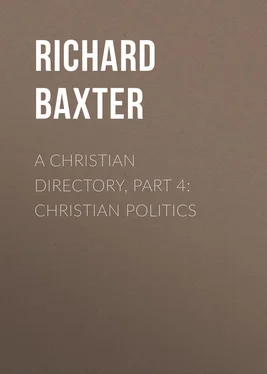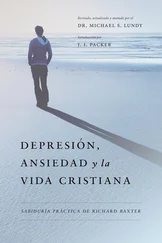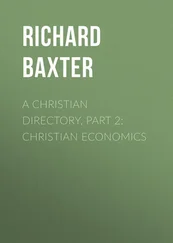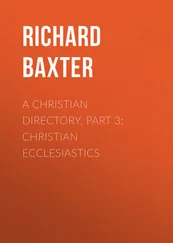Richard Baxter - A Christian Directory, Part 4 - Christian Politics
Здесь есть возможность читать онлайн «Richard Baxter - A Christian Directory, Part 4 - Christian Politics» — ознакомительный отрывок электронной книги совершенно бесплатно, а после прочтения отрывка купить полную версию. В некоторых случаях можно слушать аудио, скачать через торрент в формате fb2 и присутствует краткое содержание. Жанр: foreign_antique, foreign_prose, на английском языке. Описание произведения, (предисловие) а так же отзывы посетителей доступны на портале библиотеки ЛибКат.
- Название:A Christian Directory, Part 4: Christian Politics
- Автор:
- Жанр:
- Год:неизвестен
- ISBN:нет данных
- Рейтинг книги:3 / 5. Голосов: 1
-
Избранное:Добавить в избранное
- Отзывы:
-
Ваша оценка:
- 60
- 1
- 2
- 3
- 4
- 5
A Christian Directory, Part 4: Christian Politics: краткое содержание, описание и аннотация
Предлагаем к чтению аннотацию, описание, краткое содержание или предисловие (зависит от того, что написал сам автор книги «A Christian Directory, Part 4: Christian Politics»). Если вы не нашли необходимую информацию о книге — напишите в комментариях, мы постараемся отыскать её.
A Christian Directory, Part 4: Christian Politics — читать онлайн ознакомительный отрывок
Ниже представлен текст книги, разбитый по страницам. Система сохранения места последней прочитанной страницы, позволяет с удобством читать онлайн бесплатно книгу «A Christian Directory, Part 4: Christian Politics», без необходимости каждый раз заново искать на чём Вы остановились. Поставьте закладку, и сможете в любой момент перейти на страницу, на которой закончили чтение.
Интервал:
Закладка:
"If you will draw the picture of a good prince, delineate some celestial wight, liker to God than to a man; absolute in all perfections of virtue; given for the good of all; yea, sent from heaven for the relief of mortal men's affairs; which being ( oculatissimum ) most discerning, looketh to all! To whom nothing is more regarded, nothing more sweet, than the commonwealth; who hath more than a fatherly affection unto all. To whom every one's life is dearer than his own; who night and day is doing and endeavouring nothing else, but that it may be very well with all; who hath rewards in readiness for all that are good; and pardon for the bad, if so be they will betake them to a better course; that so freely desireth to deserve well of his subjects, that if it be needful, he will not stick to preserve their safety by his own peril; that taketh his country's commodity to be his own gain; that always watcheth, that others may sleep quietly; that leaveth himself no quiet vacancy, that his country may live in quiet vacancy, or peace; that afflicteth himself with successive cares, that his subjects may enjoy tranquillity. To conclude, on whose virtue it is, that the public happiness doth depend."
"If you would set forth a bad prince to the eye, you must paint some savage, horrid beast, made up of such monstrosities as a dragon, a wolf, a lion, a viper, a bear, &c. every way armed, with six hundred eyes; every way toothed; every way terrible; with hooked talons; of an insatiable paunch; fed with men's bowels; drunk with man's blood; that watcheth to prey upon the lives and fortunes of all the people; troublesome to all, but specially to the good; a fatal evil to the world; which all curse and hate, who wish well to the commonwealth; which can neither be endured, because of his cruelty, nor yet taken away without the great calamity of the world, because wickedness is armed with guards and riches."
CHAPTER III.
DIRECTIONS FOR SUBJECTS CONCERNING THEIR DUTY TO THEIR RULERS
Being now to speak of the duties which I must practise, and to those of my own rank, I shall do it with some more freedom, confidence, and expectation of regard and practice.
Direct. I. Though I shall pass by most of the theory, and especially of the controversial points in politics, and not presume to play the lawyer's part; yet I must advise you to understand so much of the cause, and nature, and end of government, as is necessary to direct you in your obedience, and to preserve you from all temptations to rebellion. Especially take heed of those mistakes which confound sovereignty and subjection, and which delude the people with a conceit, that they are the original of power, and may intrust it as they please; and call their rulers to account, and take the forfeiture, and recall their trust, &c. It is not to flatter kings, but to give God his due, that I shall caution you against these mistakes of popularity. And first, I shall briefly lay down the truth, and then answer some few of the chief objections.
Prop. I. That there be government in genere , and obedience thereto, is determined even in nature, by the God of nature, in making man a sociable creature, and each man insufficient for himself, and in making republics necessary to the welfare and safety of individuals, and government necessary to these republics. 36This therefore is not left to the people's wills; though some odd cases may be imagined, in which some individual persons may live out of a commonwealth, and not be obliged to live under civil government; yet that exception doth but confirm the general rule: even as all men ordinarily are bound to live in communion with some particular church, and know their own pastor, though yet some few may be excepted, as some ambassadors, travellers, seamen, soldiers, banished men, &c. So here, the obligation to live under government, lieth upon the generality of the world, though some few may be excepted.
Prop. II. Rulers therefore are God's officers, placed under him in his kingdom, as he is the universal, absolute Sovereign of the world; and they receive their power from God, who is the only original of power. Not only their strength from his strength, but their authority or governing power, (which is jus regendi ,) from his supreme authority; as mayors and bailiffs in corporations receive their power from the king. Rom. xiii. 1-3, "There is no power, but of God; the powers that be, are ordained of God."
Prop. III. This governing power in genere, is not an empty name, but in the very institution containeth in it those things materially which are absolutely necessary to the end of government.
Prop. IV. Yet God hath left that which is commonly called, the specification of government; and some lower parts of the matter, and manner of exercise, undetermined; as also the individual persons or families that shall rule. In these three therefore it is that communities interpose. 1. Whether the sovereignty shall be in one, or two, or ten, or how many, and how divided for their exercise, God hath not determined. 2. Nor hath he determined of every particular, whether the power shall extend to this, or that, or the other thing, or not? Nor whether it shall be exercised thus or thus, by standing courts, or temporary judges, &c. 3. Nor hath he named the person or family that shall rule. 37
Prop. V. Though these in the constitution are determined of by explicit or implicit contract or consent, between the ruler and the community, yet by none of these three can the people be truly and properly said to give the ruler his power of government. Not by the first or last; for both those do but determine who shall be the recipient of that power; whether one or more, and who individually. Not the second, for that is but a limiting, or bounding, or regulating the governing power, that it be not exercised to their hurt; the bounding and regulating of their power, is not the giving them power. The people having the strength, cannot be ruled against their concordant wills: and therefore, if they contract with their governors, that they will be ruled thus and thus, or not at all, this is not to give them power. Yet propriety they have, and there they may be givers. So that this bounding, or regulating, and choosing the form, and persons, and giving of their propriety, is all that they have to do. And the choosing of the family or person, is not at all a giving the power. They are but sine quibus non to that; they do but open the door to let in the governor; they do but name the family or man, to whom God, and not they, shall give the power.
As, when God hath already determined what authority the husband shall have over the wife, the wife by choosing him to be her husband, giveth him not his power, but only chooseth the man, to whom God giveth it by his standing law: though about the disposing of her estate, she may limit him by precontracts; but if she contract against his government, it is a contradiction and null. Nor if he abuse his power, doth it at all fall into her hands.
If the king by charter give power to a corporation to choose their mayor, or other officer, they do but nominate the persons that shall receive it, but it is the king's charter, and not they, that give him the power.
If a soldier voluntarily list himself under the king's general, or other commanders, he doth but choose the man that shall command him, but it is the king's commission that giveth him the power to command those that voluntarily so list themselves. And if the authority be abused or forfeited, it is not into the soldiers' hands, but into the king's.
Prop. VI. The constituting consent or contract of ancestors obligeth all their posterity, if they will have any of the protection or other benefit of government, to stand to the constitution; else governments should be so unsettled and mutable, as to be uncapable of their proper end.
Читать дальшеИнтервал:
Закладка:
Похожие книги на «A Christian Directory, Part 4: Christian Politics»
Представляем Вашему вниманию похожие книги на «A Christian Directory, Part 4: Christian Politics» списком для выбора. Мы отобрали схожую по названию и смыслу литературу в надежде предоставить читателям больше вариантов отыскать новые, интересные, ещё непрочитанные произведения.
Обсуждение, отзывы о книге «A Christian Directory, Part 4: Christian Politics» и просто собственные мнения читателей. Оставьте ваши комментарии, напишите, что Вы думаете о произведении, его смысле или главных героях. Укажите что конкретно понравилось, а что нет, и почему Вы так считаете.












